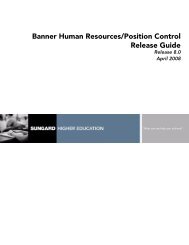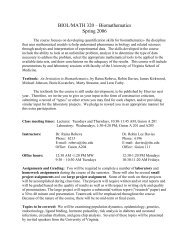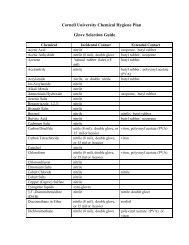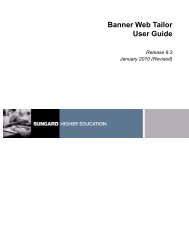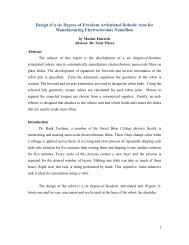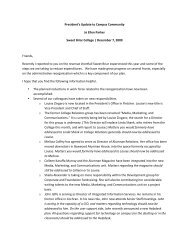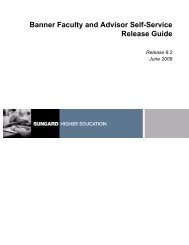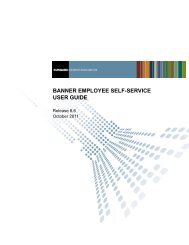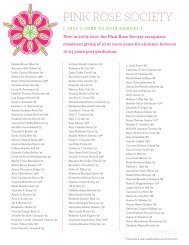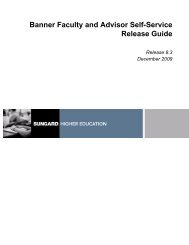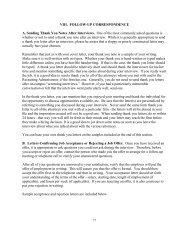sweet briar magazine inside - Sweet Briar College
sweet briar magazine inside - Sweet Briar College
sweet briar magazine inside - Sweet Briar College
Create successful ePaper yourself
Turn your PDF publications into a flip-book with our unique Google optimized e-Paper software.
In 1960, the United States and Japan<br />
signed a revised Treaty of Mutual<br />
Cooperation and Security pledging both<br />
countries to resist armed attack on<br />
territories under Japanese administration.<br />
2010 MARKS THE 50TH<br />
ANNIVERSARY of the treaty, an<br />
opportune time for both nations to take a<br />
hard look at the accord in light of political<br />
and economic developments in East Asia<br />
since its signing. e treaty positioned<br />
Japan as the linchpin for security in the<br />
region, but it’s no longer clear the<br />
agreement fulfills this vision. Carolyn<br />
Leddy ’98 spent the past year in Tokyo<br />
researching this critical and delicate balance<br />
of power as a Council on Foreign<br />
Relations/Hitachi Ltd. research fellow.<br />
Carolyn focused on the impact of u.S.<br />
extended deterrence — America’s<br />
commitment to use all means of military<br />
power, including nuclear weapons, to<br />
protect Japan from an adversary — on<br />
Japan’s defense posture. Her analysis<br />
examines how the rise of Chinese military<br />
capabilities and the nuclear and ballistic<br />
threat posed by North Korea influence<br />
Japanese strategic thinking. In her view,<br />
Japan lacks a coherent national security<br />
policy reflecting the present-day strategic<br />
reality.<br />
When the treaty was signed, it was<br />
understood that Japan would not assist any<br />
u. S. territories should the occasion arise,<br />
because its constitution forbids waging war<br />
overseas. e treaty has allowed the u.S. to<br />
provide an international security presence<br />
in East Asia, an area in which nuclear,<br />
ballistic and armed forces threats have been<br />
anything but stable. However, Carolyn<br />
suggests that Tokyo take greater<br />
responsibility for regional and international<br />
security. She believes Japan must begin this<br />
process at home by removing political<br />
constraints that hamper its ability to craft a<br />
genuine national security policy.<br />
“If u.S. naval vessels were engaged in<br />
training operations in international waters<br />
off the coast of Japan and came under<br />
attack from North Korea, Japan could not<br />
come to the aid of the u.S.,” she wrote<br />
recently in the Wall Street Journal. “A<br />
similar constitutional interpretation also<br />
prohibits Japan from acting to intercept a<br />
North Korean ballistic missile headed for<br />
the u.S.” Carolyn says it’s been a bumpy<br />
year for the u.S.-Japan alliance, and she<br />
hopes that she has contributed to the<br />
dialogue on the future role of international<br />
security between the two countries in a<br />
constructive way.<br />
Carolyn’s strong interest in<br />
international politics grew from her junior<br />
year abroad in the Czech Republic. An<br />
internship at the u.S. Embassy in Prague<br />
gave her an opportunity to see firsthand the<br />
ups and downs of implementing a<br />
democratic system. Carolyn pursued her<br />
interests in graduate school at Columbia<br />
J a P a N<br />
Capital<br />
Tokyo<br />
Largest city<br />
Tokyo<br />
Official language(s)<br />
None<br />
Government<br />
Constitutional monarchy<br />
Area<br />
145,925 sq mi<br />
Population<br />
2010 estimate<br />
127,420,000<br />
GDP (PPP)<br />
2009 estimate<br />
$4.267 trillion<br />
Per capita$33,478<br />
Drives on the left<br />
F E A T U R E S T O R Y<br />
SBC.EDU | SWEET BRIAR MAGAZINE<br />
21




